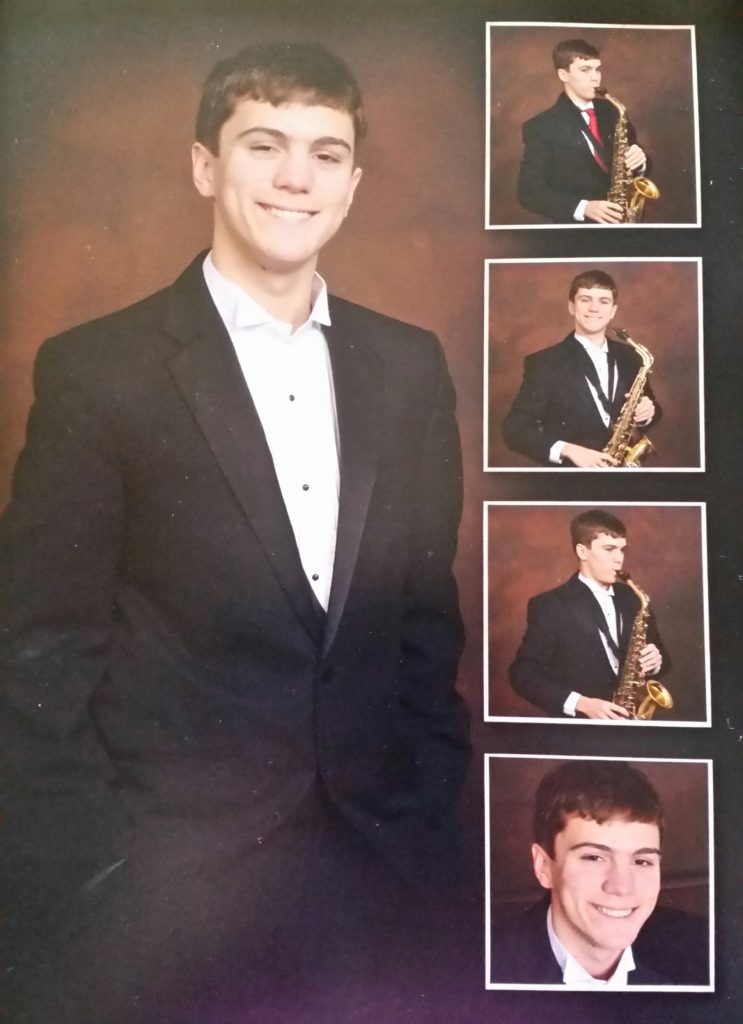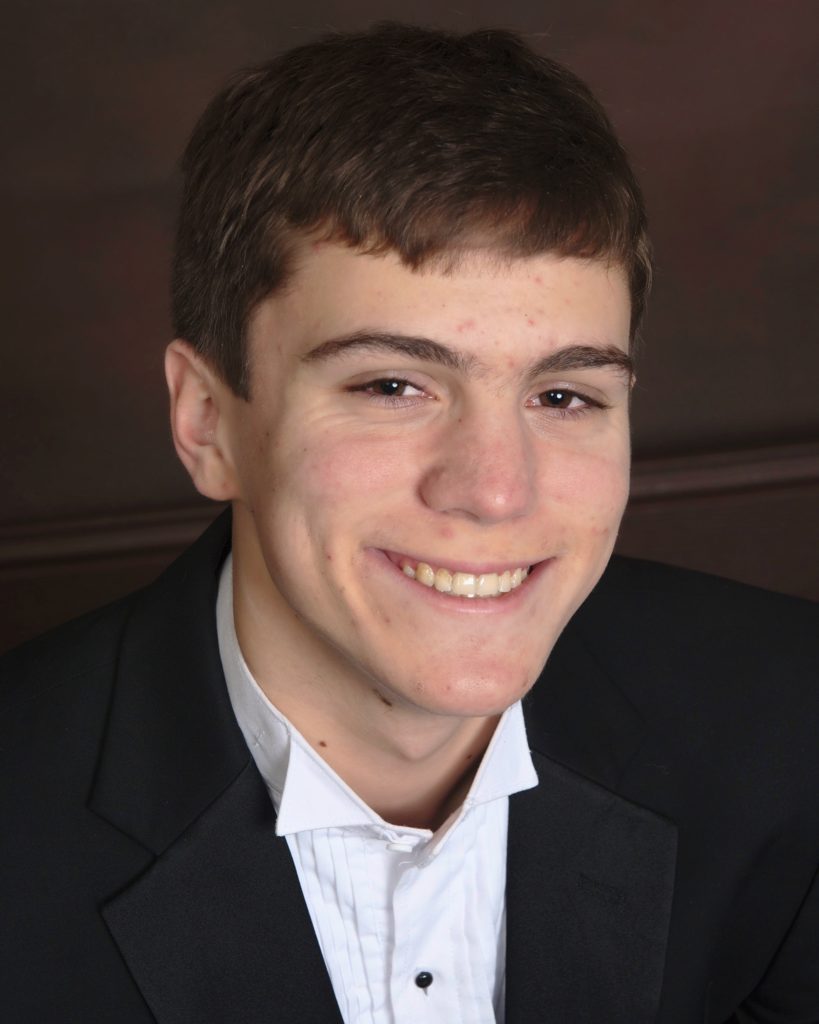 What drew you to music and specifically the saxophone?
What drew you to music and specifically the saxophone?
Well, ever since I’ve been in elementary school, I knew I wanted to play an instrument. When I saw the middle school band playing, I knew it was something I wanted to be a part of. Sixth grade was the first opportunity I had to start learning an instrument. Originally, my band teacher told me to play the French Horn, so I went to the local music store to try one out. I picked up the French Horn, put it to my lips, and I couldn’t make a sound. But then, the store owner handed me a saxophone. I blew into it, made the most wretched, awful sound I’d ever heard, and I took it right then.
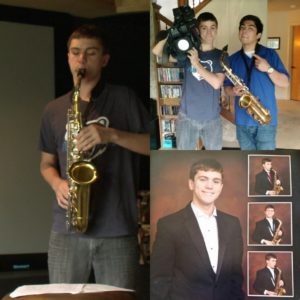 What is your practice schedule like for the saxophone? How do you balance that with school work and your other activities?
What is your practice schedule like for the saxophone? How do you balance that with school work and your other activities?
I practice around an hour a day, at least 5 days a week. Balancing isn’t too hard since most of my teachers understand the commitments I have to band, and finding time to practice isn’t difficult when I enjoy it so much. Most of my other activities involve my music in some way from practicing, private lessons, performances, class work, school related travel, and fundraising for our band activities.
Some teenagers like to give others a hard time and even bully them by saying music isn’t cool or whatever. Have you had this issue and if so, how did you deal with it?
I guess when I first started playing, there was a little bit of belittlement towards the band, but I’ve found most people in band will stick up for each other, and usually it’s not an issue. The band I’m in now has a lot of support from the school, and I’ve found that it’s the same case at most high schools. I’m very fortunate to be in a music program that is very highly recognized for its excellence, so people in our area are very positive about it.
Please tell us more about this special program and your nomination into it. How did this come about and/or how did you qualify to become a part of it?
In the fall of 2015, my school’s band teacher, Mr. Eric Parker (Central Valley High, Spokane Valley, WA) urged all of us to audition for the Western International Band Clinic (WIBC) that was taking place in Seattle. WIBC accepts auditions from high schools across the western U.S. and a small group of exchange students from Australia and selects approximately the top three hundred musicians to form three levels of bands. Each group is divided by skill level, so they are comparable. Me and three other members from my school were selected to participate. I was put on first alto sax (which meant I had a lead position).
Then, from the three hundred students that form the WIBC band, thirteen students were selected to participate in the Pacific Honors Ensemble Program (PHEP) in Australia during the fall of 2016. These students have to be juniors at the time of nomination as the trip takes place during their senior year of high school. It is an incredible opportunity to be part of this group.
At PHEP, we are the only U.S. students to be involved in this prestigious honor band event. This is the ninth year of activities and it is growing with a group of fifteen Australian honor band students participating in WIBC in 2015. The event provides high school musicians the opportunity to work directly with a team of eminent international and national conductors. The event takes place in the world-class environment of the Queensland Conservatorium Griffith University (Brisbane, Australia). The program offers the pursuit of excellence to young ensemble-based instrumentalists in Wind Orchestras, String Orchestras and Choral Ensembles in an intensive four-day program that culminates in four gala concerts in the Conservatorium Theater.
I’m honored to be one of the thirteen selected to participate and represent the entire U.S.! It’s like being chosen for the Olympic Team of music.
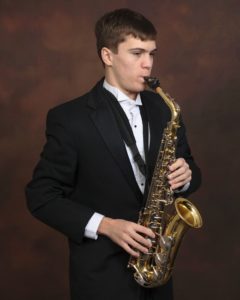 What is your favorite genre of music to play and why?
What is your favorite genre of music to play and why?
It’s kind of hard to tell you my favorite genre of music to play because I enjoy playing music in both Jazz and Classical, and there’s benefits to both. In Classical music, alto sax is not by any means one of the lead voices. In fact, a lot of famous bands don’t even include any sax in their ensembles at all. Sometimes this can lead to the music being fairly boring for me and the other sax players because the music we get is often either supposed to be played quietly or we’re supposed to be copying another instrument’s part.
In Jazz Band, alto sax is one of the most important instruments in the band. The music I get is more exciting and fast, and I usually can get an improv solo here and there. Jazz solos are a lot of fun because it’s about composing on the spot, technical skill, and expression. I find improv to be one of the most challenging parts to playing saxophone because things almost never go right. While there’s no “wrong notes” in a jazz solo, there’ll almost always be a note or two that doesn’t fit the key or that doesn’t sound very good.
That being said, classical solos are probably my favorite kind of solos to play. With a classical solo, the music is specifically written for alto sax, and all the music is written out right there. When I play a classical solo I take the notes I’m given and I can be as expressive with them as I like. I guess I’m more comfortable playing classical solos because I don’t have to worry about playing “wrong notes”, I can focus on playing what’s written on the page to the best of my ability and producing beautiful sounds.
Please tell us what you are most looking forward to in this program?
I am most looking forward to having the opportunity to visit a new country and experience all that they have to offer. I never dreamed that I would be able to travel all the way to Australia for my music while still in High School. Seeing all of the interesting sites (like the Sydney Opera House and the Great Barrier Reef) and experiencing a different culture (we get to stay with host families for several days) is amazing. Plus, I get the chance to work with an incredible group of musicians while being instructed by international conductors and teachers. I know this is something that many high school musicians don’t get to experience.
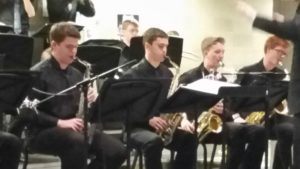 What has been the feedback from your friends and family concerning this trip?
What has been the feedback from your friends and family concerning this trip?
Everyone has been very supportive and encouraging. My family and friends understand that this is an once in an lifetime opportunity and are excited for me to get to participate. They are making lots of recommendations on what to see while I’m there, and some have shared their own experiences. I even had a local news station, KREM News in Spokane, WA, do an interview with me, and it was on TV. Students at my school thought it was cool that a news truck was there, and when they came to my home, I got to perform live for the camera. All the exposure makes my family very proud of how far I have come since those early days of making horrible noises. A lot of friends, family, and even strangers have provided financial contributions to help cover my costs for this trip. I’m very grateful for all the support.
Have you written and/or performed your own original works?
Yes, I’ve written some solo music, but I’ve never had the opportunity to perform it. All the music I’ve performed has been through my band classes and through solo competition. In solo competition, original works are allowed, but if you perform an original piece, you can’t compete in state competition. Also, my writing is nowhere near as good as the music written by professionals that I play. I’m sure at some point I may have more opportunities to develop my own writing skills.
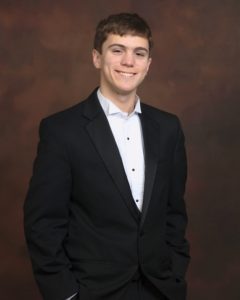 What are the benefits and challenges about being a young musician?
What are the benefits and challenges about being a young musician?
Being a young musician today has many benefits as it is a lot easier than it has been in the past. First, the stereotype of “nerdy band geek” is all but gone. People see how much effort musicians put into their work and respect that. Especially with teachers, employers and colleges, musicians are valued for dedication and hard work. Secondly, music is more easily accessible than ever before. I can go on YouTube and find any jazz band – ranging from the beginning of jazz in the 1920’s to the modern pop-culture jazz bands of today. In addition, you can find any classical saxophonist from Adolph Saxophone (the inventor of the saxophone) to Eugene Rousseau (one of the best classical saxophonists ever). The amount of music to choose from is limitless and it provides lots of samples to learn from and study.
As for challenges, it would have to be the competition. There’s so many young and old performers out there who are miles ahead of me in both their skill level and experience. I’m competing against many of them for spaces at colleges and universities, and in the future for professional work. With all the competition, it’s easy to get into the mindset of “I’ll never be as good as them.” To stay motivated, I try to find people in my area who are above my skill level to practice with and learn from. Finding teachers like my band conductor, Mr. Parker and my private instructor, Chris Parkin (Whitworth University) help me perfect my talent and ensure I’m learning as much as I can. They also provide strong advice and criticism, so that I know what areas to work on. Having strong teachers is essential to your ongoing success. When they see how hard you work at your craft, they encourage you to take advantage of special opportunities like the PHEP and WIBC experiences. I get nominated for chances to perform locally, out of state, and even internationally. Even the chance to perform solo bits during local band concerts is a privilege because it lets me know that they have confidence in my performance. Sure, I’ve made a lot of progress, but I wouldn’t have made it anywhere without my friends and teachers who have taught me so much.
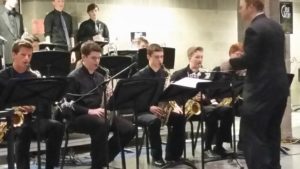 Why did you chose online fundraising as opposed to other methods? Or is the online fundraising something you are doing along with other forms? What has been the response?
Why did you chose online fundraising as opposed to other methods? Or is the online fundraising something you are doing along with other forms? What has been the response?
My mom has a background in marketing and we talked a lot about ways that I could try to raise money to cover the expenses for my trip (international travel is very expensive, and I had to cover all of my costs, including airfare). Since my school schedule is so busy, and we have tight timelines for each installment payment, it made sense to utilize the internet and social media to raise the majority of my funds. I created a GoFundMe.com page and linked it to my Facebook and Twitter pages. This allows me to reach as many people as I can very quickly. We have also researched other outlets for musicians to share their stories and music online. I’ve tried to keep my pages updated with new music samples every couple weeks and when something exciting like an audition or news story happens, I post that too.
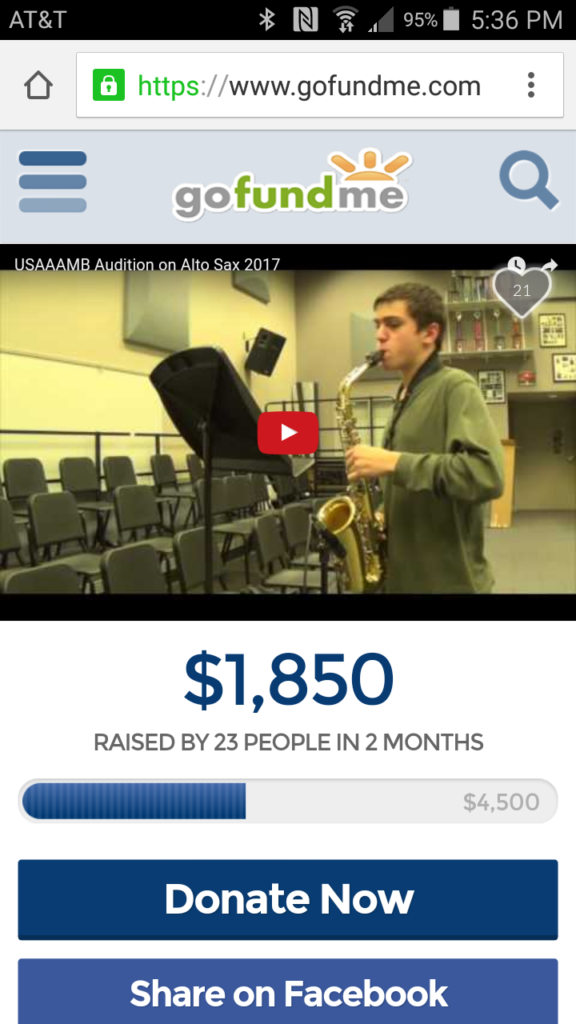 I have had great feedback from my campaign and have raised half of what I need for my trip ($4,500 total, and I’m at about $2,275 now). Everyone from family, friends, and past scout leaders to strangers who have heard about my nomination have contributed and shared their words of encouragement and support. The best thing about doing things electronically is that people who might not have the opportunity to hear me play live can login and hear actual samples of my music. Plus, they can share the links with other people they know and help show their support just through sharing. The more people who can hear my story and know that I am only one of thirteen to represent the U.S., the better my chances are to raise everything I need. You can view my campaign at www.gofundme.com/dylanphep2016
I have had great feedback from my campaign and have raised half of what I need for my trip ($4,500 total, and I’m at about $2,275 now). Everyone from family, friends, and past scout leaders to strangers who have heard about my nomination have contributed and shared their words of encouragement and support. The best thing about doing things electronically is that people who might not have the opportunity to hear me play live can login and hear actual samples of my music. Plus, they can share the links with other people they know and help show their support just through sharing. The more people who can hear my story and know that I am only one of thirteen to represent the U.S., the better my chances are to raise everything I need. You can view my campaign at www.gofundme.com/dylanphep2016
What are your plans for the future? Are you planning to pursue a career in the music field?
In the future, I plan on majoring in Music after high school, either performance or education or a combination of the two. I’m still deciding which route is the best for me, but I know for certain that my future will involve playing in some way. Everyone keeps telling me to follow my passion, and for me that is definitely music.
What would you say to a young person considering getting involved in music?
To the young people who are considering getting involved in music, I’d tell them to go for it! There’s nothing more satisfying and fun than learning an instrument or learning to sing and perfecting that talent. It may seem really daunting to people who have never attempted it before, but it’s really not as difficult as it seems. Anyone can learn to play an instrument; it just takes a little bit of dedication and time. There’s plenty of resources in your area and online to help you get started. Learning to play saxophone has been one of the best things in my life, and if anyone is thinking about trying it, I couldn’t encourage them more.
Now, if you’re anything like me, you might be agitated about the future because of all the “bad kids” we hear about regularly on the news and elsewhere. Every time we turn around, a young person (and often, it’s a young man) has gotten involved with something sordid, and those of us over the “30’s” mark become gravely concerned that maybe our future won’t be so bright after all. However, Dylan is an absolute shining star who brings a massive ray of sunshine to dispel the darkest night. He has this opportunity to be an ambassador for young people and represent our nation in another country. Furthermore, he is just the kind of young man whom I believe deserves our sincerest support. I realize this interview is a little bit different than most, but it is these stories that I would call my “passion projects,” as Barbara Niven so aptly put it in a recent interview. Dylan is the kind of person who will change this world for the better, and every one of you has an opportunity to be a tiny part of the process. As you always hear, every little bit helps, and I know Dylan and his mother will not forget to show their gratitude to you. His final payment is due July 1st, and I know that my supporters can help him meet his goal. Please consider donating something, and if you are unable to, please at least share this interview. Be sure to check out all the many links below for more information including his GoFundMe page.
Music in Australia – PHEP 2017 Fundraising Campaign:
https://www.gofundme.com/dylanphep2016
USAAAMB Audition
Classical Sax Sample:
Bernhard Heiden’s Sonata for Alto Saxophone|| Excerpt from Mvmt 1
Bernhard Heiden’s Sonata for Alto Saxophone|| Excerpt from Mvmt 1 from Premium Slice on Vimeo.
Body & Soul (Jazz Sample):
Body and Soul from Premium Slice on Vimeo.
Pacific Honors Ensemble Program website and student bios:
http://phepband.wix.com/phep16
Interview with KREM News 2 (Matt Vergara):
http://www.krem.com/news/local/spokane-county/talented-spokane-teen-jams-his-way-to-australia/170401860
Small music excerpt from Jazz Under the Stars Night at CVHS (via Facebook, he is third chair from left in front row):
https://m.facebook.com/story.php?story_fbid=10210036243292797&id=1537849721&_rdr
1 Comment
-
Thats amazing!

